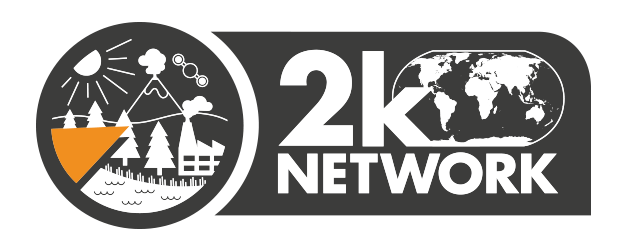- Home
- Publications
- PAGES Magazine
- Phase 4 of The PAGES 2k Network: Hydroclimate of The Common Era
Phase 4 of the PAGES 2k Network: Hydroclimate of the Common Era
PAGES 2k Network coordinators
Past Global Changes Magazine
30(1)
52
2022
PAGES 2k Network coordinators
The PAGES 2k Network (pastglobalchanges.org/2k), founded in 2008, is one of the longest-running PAGES working groups. It has consistently achieved a high degree of community engagement and delivered significant datasets and publications. These have fundamentally improved our understanding of global climate changes through the Common Era. The 2k reconstructions of global temperature variability were featured in Figure 1 of the Summary for Policymakers of the IPCC’s Working Group I contribution to the Sixth Assessment Report (AR6; IPCC 2021).
Along with temperature, hydroclimate is an important way in which societies experience climate variability. However, AR6 highlighted notable uncertainty in historical (Fig. 1) and projected hydroclimate changes, and low agreement on the regional scale (Fig. 1). Constraining the models used to simulate future changes, and using these same models to provide dynamical understanding of past hydroclimate, are therefore the main foci of the new (4th) phase of the 2k Network.
 |
|
Figure 1: This photograph was taken a few days after a forest fire in a pine-forested area near Montellano (SW Spain) (photo credit: Antonio Jordán, University of Seville, Spain; imaggeo.egu.eu/view/1327). License: CC BY-NC-SA 3.0 (creativecommons.org/licenses/by-nc-sa/3.0). |
Phase 2 of the 2k Network (2014–2016) provided recommendations for incorporating paleoenvironmental data and climate model simulations to understand hydroclimate (PAGES Hydro2k Consortium 2017). Building on this, Phase 3 (2017–2021) supported the development of new databases, including:
- Iso2k (pastglobalchanges.org/iso2k), a compilation of proxy records preserving information of hydroclimate changes via their imprint in the stable isotopic composition of water;
- CoralHydro2k (pastglobalchanges.org/coralhydro2k), a collection of paired coral δ18O and Sr/Ca records that can be used to investigate temperature and hydrologic variability in the tropical to subtropical oceans; and
- CLIVASH2k (pastglobalchanges.org/clivash2k), a collection of ice core proxies to understand southern hemispheric climate modes.
These 2k Network products, and other data compilations, contain extensive information about hydroclimate-relevant variables (e.g. precipitation amount, the ratio of precipitation to evaporation, atmospheric circulation patterns, drought, floods, and seawater characteristics). Hydroclimate changes are inherently more complex than temperature changes, which motivates the science goals of the new phase.
Scientific goals
Phase 4 of the 2k Network builds on previous and ongoing projects, as well as modeling and data synthesis and assimilation activities within the wider paleoclimate community, to better understand Common Era hydroclimate by working on the following objectives:
- Leverage paleoclimate proxy information contained in ongoing and existing databases (e.g. Iso2k, CoralHydro2k, CLIVASH2k, drought atlases, Neotoma, SISAL), and datasets not yet collated in databases, to understand spatial and temporal hydroclimate variability. This includes developing a better understanding of uncertainties.
- Use the hydroclimate proxy and reconstruction data to evaluate Earth system models, whilst using these models to inform process-level understanding of Common Era hydroclimate. This includes close integration with the modeling communities.
- Ensure that 2k Network data products are available for ongoing use through dedicated tools and practices to maximize their longevity and interoperability.
- Work with policy advisors to ensure that 2k Network scientific findings will be used to inform policy outcomes.
Invitation to engage in Phase 4 activities
To achieve our aims, the coordinators will facilitate interaction among researchers. This includes liaising with ongoing 2k research efforts as well as partner research groups and external stakeholders, e.g. CVAS (pastglobalchanges.org/cvas), SISAL (pastglobalchanges.org/sisal), Floods (pastglobalchanges.org/floods), PMIP-Past2k (pmip.lsce.ipsl.fr/working_groups/Past2K), LinkedEarth (linked.earth), and WCRP Lighthouse Activities (wcrp-climate.org/lha-overview). We are particularly interested in participation from the modeling community to ensure that we collate hydroclimate proxy data that enables meaningful comparison with climate model outputs. We invite researchers that participate in these groups to contact us if they would like to be a formal liaison.
Interactions facilitated by the 2k Network will include workshops, a continuation of the successful online 2k seminar series, and engagement with early-career researchers (ECR). The first workshop will be held as a splinter meeting of the PAGES OSM (May 2022). This workshop will scope what steps are required to mine hydroclimate-relevant information from existing databases, identify data that are not yet in databases, and connect to data assimilation and climate simulation efforts. A second workshop will focus on data–model integration, including proxy system model steps, and a third workshop will develop tools to ease data re-use and interoperability. The PAGES 2k coordinators will apply for a PAGES Data Stewardship Scholarship (following up on three successful 2k Network-related proposals in 2021) and additional funding. We invite researchers to get in touch if interested in giving a seminar (or with topics that you would be interested in hearing about!), to participate in database compilation, and if specific workshop themes are of interest. We also aim to enable discussion on data accessibility and software tools through dedicated projects with the ECR and LinkedEarth communities.
To succeed in our plans, the 2k Network relies on the engagement of the wider community. We are excited to invite you to our first Phase 4 virtual workshop to be organized online at the PAGES Open Science Meeting (pages-osm.org) in May 2022.
affiliationS
A. Atwood (Florida State University, Tallahassee, FL, USA)
O. Bothe (Helmholtz-Zentrum Hereon, Geesthacht, Germany)
S. Eggleston (Past Global Changes, International Project Office, Bern, Switzerland)
G. Falster (Australian National University, Research School of Earth Sciences, Canberra, Australia)
B.J. Henley (Monash University, Clayton, Australia)
M. Jones (University of Nottingham, UK)
L. Jonkers (MARUM, University of Bremen, Germany)
N. Kaushal (ETH Zürich, Switzerland)
B. Martrat (Institute of Environmental Assessment and Water Research (IDAEA-CSIC), Barcelona, Spain)
H.V. McGregor (University of Wollongong, Australia)
A. Orsi (University of British Columbia, Vancouver, Canada)
S.J. Phipps (Ikigai Research, Hobart, Australia)
H. Sayani (SLR International Consulting, Atlanta, GA, USA)
contact
Nikita Kaushal: nikitageologist gmail.com
gmail.com
references
